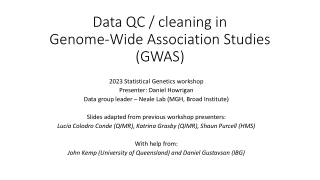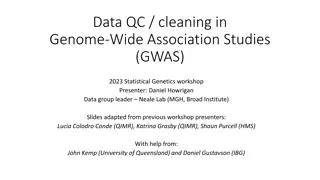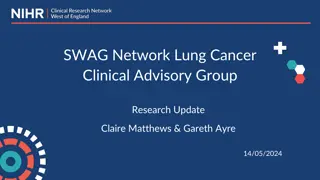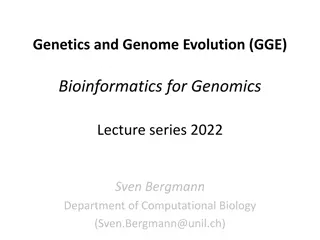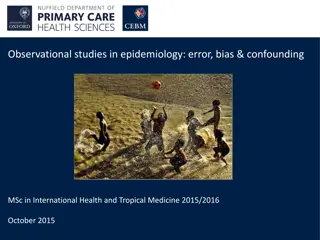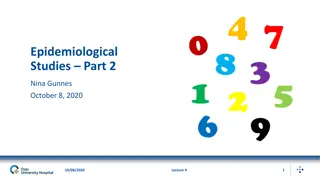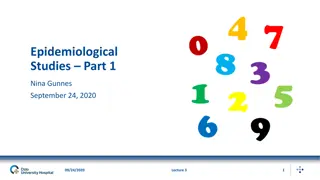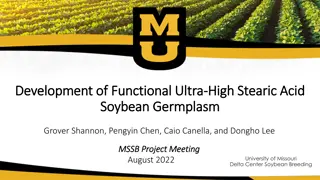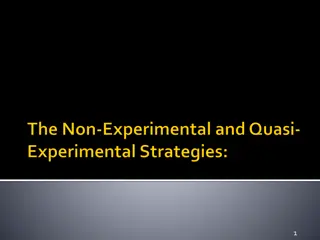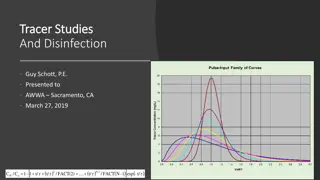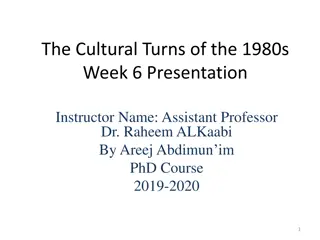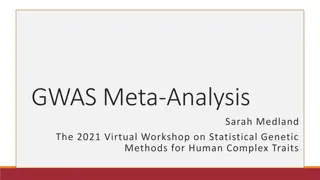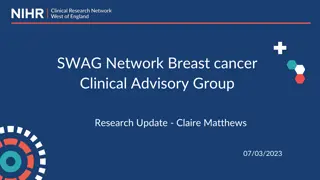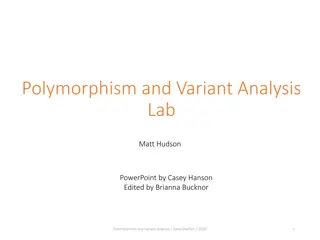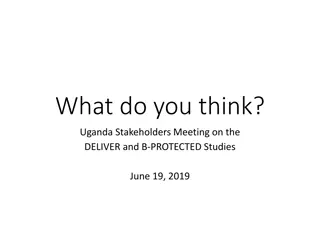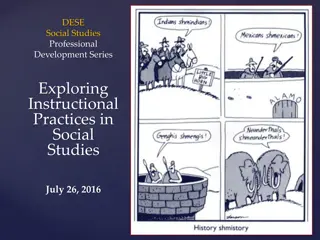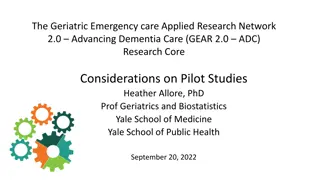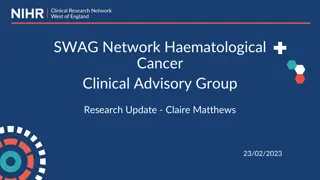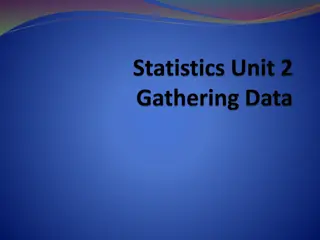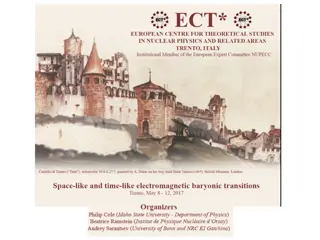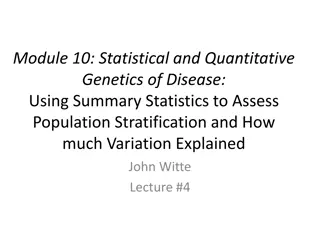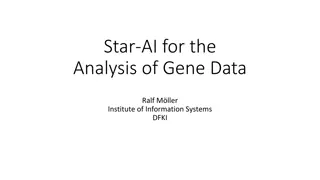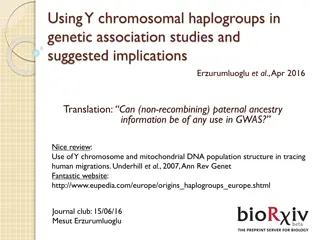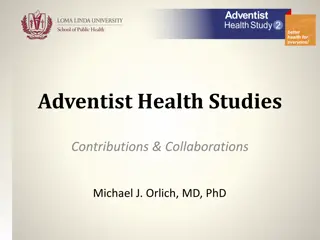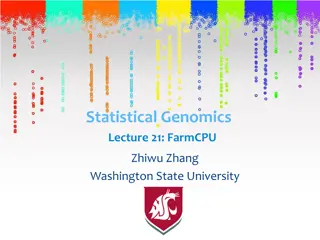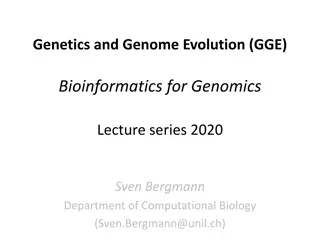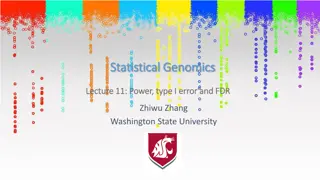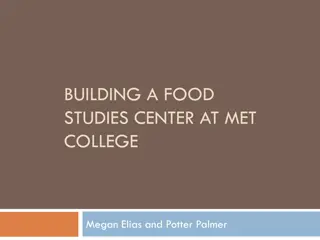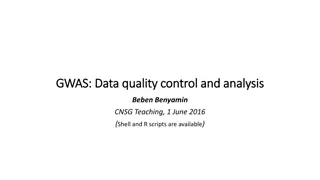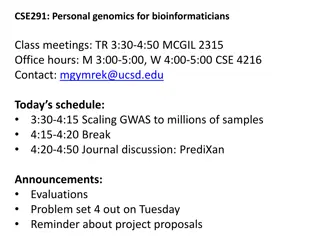Data QC / cleaning in Genome-Wide Association Studies (GWAS)
Daniel Howrigan, Data group leader at Neale Lab (MGH, Broad Institute), for a workshop on data QC and cleaning in GWAS. Learn about goals of GWAS, genetic data visualization, QC methods, and more.
2 views • 35 slides
Understanding Genome-Wide Association Studies in Statistical Genetics Workshop
Explore the essentials of Genome-Wide Association Studies (GWAS) and genetic data quality control as presented by Daniel Howrigan in the 2023 workshop. Delve into the goals of GWAS, genetic data characteristics, SNP variations, and genotyping techniques. Gain insights into moving from trait heritabi
0 views • 35 slides
Remarkable Opportunities in Higher studies after Civil Engineering
Higher studies after Civil Engineering in Tamil Nadu\nCivil engineering stands at the forefront of shaping our physical environment; from the infrastructure we rely on daily to the sustainable development of our cities. Further, pursuing Higher studies after Civil Engineering opens up countless oppo
0 views • 2 slides
Latest Research and Studies on Lung Cancer - Update May 2024
This research update includes information on national recruitment to lung cancer studies, comparison of national vs. regional recruitment, and detailed descriptions of various studies and trials related to lung cancer. The studies cover areas such as treatment advancements, observational studies, ma
2 views • 13 slides
Bioinformatics for Genomics Lecture Series 2022 Overview
Delve into the Genetics and Genome Evolution (GGE) Bioinformatics for Genomics Lecture Series 2022 presented by Sven Bergmann. Explore topics like RNA-seq, differential expression analysis, clustering, gene expression data analysis, epigenetic data analysis, integrative analysis, CHIP-seq, HiC data,
0 views • 36 slides
Understanding Observational Studies in Epidemiology
Delve into the realm of observational studies in epidemiology, exploring concepts such as error, bias, and confounding. Discover the significance of various study designs, from case reports to prospective cohort studies, in elucidating associations and establishing causality in non-communicable dise
0 views • 58 slides
Overview of Cohort Studies in Epidemiology
Cohort studies are a type of observational study where a group of healthy subjects is followed over time to investigate relationships between exposures and outcomes. They provide valuable insights into disease development and risk factors, offering advantages like assessing multiple exposures and en
0 views • 21 slides
Overview of Ecological Studies in Epidemiology
Ecological studies in epidemiology involve studying groups of individuals at a population level to examine the correlation between exposure and disease occurrence. While cost-effective and useful for generating hypotheses, ecological studies have limitations, such as the inability to control for con
3 views • 21 slides
BSc in Strategic Studies & International Relations at KDU
The Faculty of Defence and Strategic Studies at KDU offers a hybrid BSc degree in Strategic Studies and International Relations to prepare skilled professionals in national security and foreign relations. The program aims to develop theoretical and research skills for analyzing international politic
0 views • 8 slides
Innovative Development in High Stearic Acid Soybean Germplasm Breeding at University of Missouri Delta Center
Innovative research on developing high stearic acid soybean germplasm is being conducted at the University of Missouri Delta Center. Challenges in breeding high stearic soybeans, such as sodium azide-induced deletions and mutant alleles in SACPDs, are being addressed. Promising lines identified from
1 views • 9 slides
Overview of Media Studies Disciplines and Historical Development
Media studies is a multidisciplinary field that explores the content, history, and effects of various media, with roots in the relationship between media and culture. Originating in the 1920s, media studies draws on traditions from social sciences and humanities, incorporating theories from discipli
5 views • 18 slides
Understanding Post-Authorisation Safety Studies (PASS) in Pharmacovigilance
Post-Authorisation Safety Studies (PASS) are conducted after a medicinal product is authorized to gather more safety information or assess risk management effectiveness. These studies evaluate the safety and benefit-risk profile of the product, aiding regulatory decision-making. PASS aims to identif
0 views • 4 slides
Understanding Nonexperimental and Quasi-experimental Studies
Nonexperimental and quasi-experimental studies resemble experiments but lack random assignment, making them valuable for group comparisons without establishing causation. This type of research design looks at differences between groups that already exist, focusing on group differences rather than ca
1 views • 35 slides
Understanding Tracer Studies and Disinfection in Water Treatment
Tracer studies play a crucial role in determining hydraulic efficiencies and disinfectant exposure times in water treatment processes. This presentation by Guy Schott covers the purpose of tracer studies, water age distribution, disinfection exposure time, CT disinfection, log inactivation, and more
0 views • 34 slides
The Cultural Turns of the 1980s in Translation Studies
This presentation explores the various cultural turns in Translation Studies during the 1980s, highlighting key scholars such as Snell-Hornby and Even-Zohar. It discusses the linguistic turn, pragmatic turn, and the significance of cultural studies in understanding translation processes, particularl
0 views • 30 slides
Meta-Analysis in GWAS: Methods and Applications
Meta-analysis in GWAS involves combining data across studies to estimate overall effects, explore cohort differences, improve power, and replicate findings. It includes joint vs. meta-analysis, methods, and types such as fixed effect and random effect meta-analyses.
0 views • 20 slides
Understanding Clinical Trials: Types and Designs
Clinical trials are essential research studies that evaluate new tests and treatments to improve human health outcomes. They involve various phases, designs, and purposes, such as treatment trials, prevention trials, and observational studies. Different types of clinical trial designs include experi
7 views • 18 slides
Breast Cancer Research Updates and Recruitment Data Overview
This document provides updates on breast cancer research, focusing on recruitment data and studies conducted between 2019 and 2023. It includes information on national and regional recruitment to breast cancer studies, SWAG region lead network studies, and opened breast cancer studies in 2022/2023.
0 views • 13 slides
Polymorphism and Variant Analysis Lab Exercise Overview
This document outlines a lab exercise on polymorphism and variant analysis, covering tasks such as running Quality Control analysis, Genome Wide Association Test (GWAS), and variant calling. Participants will gain familiarity with PLINK toolkit and explore genotype data of two ethnic groups. Instruc
0 views • 43 slides
Uganda Stakeholders Meeting on DELIVER and B-PROTECTED Studies - June 19, 2019
Stakeholders in Uganda convened on June 19, 2019, to discuss the DELIVER and B-PROTECTED studies evaluating PrEP and the dapivirine ring in pregnant and breastfeeding women. The discussions included concerns about community involvement, reasons why women may hesitate to join the studies, and the enr
0 views • 9 slides
Exploring Social Studies Instructional Practices: Professional Development Series
Join the DESE Social Studies Professional Development Series to delve into instructional practices in social studies. Connect with educators, explore pedagogy, and engage in hands-on activities like the Elephant and Giraffe exercise. Learn from ELA directors, Missouri Writing Project experts, and Ar
0 views • 14 slides
Pilot Studies in Advancing Dementia Care: Core Considerations
Pilot studies play a crucial role in exploring interventions, determining necessary modifications, assessing feasibility, and confirming stakeholder acceptance. They help in testing study protocols, assessing data collection procedures, and evaluating outcome measures. Feasibility studies are essent
0 views • 9 slides
Hematological Cancer Clinical Studies Update and Recruitment Statistics
Latest update on hematological cancer clinical studies from the SWAG.Network Haematological Cancer Clinical Advisory Group, including national recruitment data, regional recruitment comparisons, open studies, and sample size information for ongoing studies. This comprehensive update covers a range o
0 views • 14 slides
Choosing Between Observational Study and Experiment in Research
Observational studies involve recording data without interfering with subjects, while experiments impose treatments on subjects to establish cause and effect. A well-controlled experiment is crucial for determining causation, while observational studies can provide quick results at lower costs. Each
0 views • 24 slides
Advances in Baryon Spectroscopy and Hadronic Matter Studies
Discussions at the meeting focused on interpreting HADES results for e+e- and meson production in hadronic reactions, with studies involving proton, pion, light, and heavy ion beams. The role of time-like electromagnetic transitions, baryon spectroscopy, and connecting hadronic matter studies were e
0 views • 12 slides
Statistical and Quantitative Genetics of Disease: Understanding Population Stratification
This lecture explores the use of summary statistics to assess population stratification and the impact of LD on association studies in statistical and quantitative genetics. It delves into LD scores, genomic inflation, polygenic inheritance, and separating SNP heritability from population stratifica
0 views • 29 slides
Understanding Targeted Clinical Investigation in Pharmacovigilance
Targeted clinical investigation plays a crucial role in pharmacovigilance by further evaluating significant risks identified in pre-approval clinical trials. This involves conducting pharmacokinetic and pharmacodynamic studies, genetic testing, interaction studies, and large simplified trials to ass
0 views • 12 slides
Star-AI for Genetic Data Analysis: Incorporating Knowledge in Statistical Modeling
Knowledge-based approaches are crucial in genetic data analysis to enhance the accuracy and scope of genome-wide association studies (GWAS). Stochastic Relational AI (Star-AI) offers a solution by leveraging probability theory and First Order Logic to capture complex genetic interactions. By integra
0 views • 10 slides
Genomic Imputation Pipeline Overview
This document outlines a genomic imputation pipeline for multiple GWAS studies using reference panels such as 1000 Genomes Phase I data. It covers steps like data matching, phasing, and imputation using tools like Beagle and Minimac. The expected output includes imputed dosages and quality measures.
0 views • 6 slides
Concentration and Minor Requirements for Bachelor of General Studies (BGS)
Bachelor of General Studies (BGS) students at Northwestern State University of Louisiana must complete a concentration consisting of 36 hours, with a minimum of 12 hours at the 3000 and 4000 levels taken at NSU. The popular concentrations are Social Science, Computer & Natural Science, and Arts & Co
0 views • 9 slides
Understanding Y Chromosomal Haplogroups in Genetic Studies
Exploring the utility of non-recombining paternal ancestry information in Genome-Wide Association Studies (GWAS) through the analysis of Y chromosomal haplogroups. This review delves into the implications of using Y chromosome and mitochondrial DNA data in tracing human migrations, ancestry, bottlen
0 views • 27 slides
Exploring Pesticide Monitoring and Contamination Studies in Maine
Mary Tomlinson's work with the Maine Board of Pesticides Control includes past studies on groundwater and surface water monitoring, ongoing monitoring initiatives, and future collaborative studies. The State Law mandates residue surveys to identify possible contamination sources and develop a pestic
1 views • 55 slides
Adventist Health Studies Contributions & Collaborations Overview
Adventist Health Studies have made significant contributions to understanding the health and longevity advantages of Seventh-day Adventists, particularly focusing on vegetarian diets and cardiovascular health. With a history spanning over 57 years and various cohort studies, these studies have provi
0 views • 12 slides
Guide on Using BLINK C Version for Genetic Analysis
This guide provides step-by-step instructions on how to effectively use the BLINK C version for genetic analysis. It covers tasks such as preparing input files, handling phenotype and covariates data, implementing GWAS using BLINK, transforming genotype data, compressing to BLINK binary format, conv
0 views • 9 slides
Advancements in Statistical Genomics: FarmCPU and Method Development
Exploring the evolution of statistical genomics techniques, this lecture delves into the history of FarmCPU and BLINK, addressing challenges in GWAS and the development of models like PC+SNP+e and PC+Kinship+e. It also covers popular software packages in the field and the importance of moving beyond
0 views • 24 slides
Understanding Genomics and Bioinformatics in Genetics Evolution
Delve into the world of genomics and bioinformatics through the Genetics and Genome Evolution (GGE) lecture series by Sven Bergmann. Explore topics such as RNA-seq analysis, differential expression, gene expression measurement techniques, and integrative analysis with epigenetic data. Gain insights
0 views • 37 slides
Understanding Power, Type I Error, and FDR in Statistical Genomics
Explore concepts of statistical genomics in Lecture 11 focusing on power, type I error, and false discovery rate (FDR) in GWAS analysis. The content covers simulations of phenotype from genotype data, GWAS by correlation, resolution and bin approach, and implications on QTN bins for power and error
0 views • 21 slides
Building a Food Studies Center at Met College
Establishing a Food Studies Center at Met College, driven by the merging of Food and Wine courses with Gastronomy programs, aims to integrate hands-on and academic approaches to food studies. Drawing inspiration from existing models like the Culinaria Research Centre and the Center for Regional Agri
2 views • 8 slides
Understanding GWAS: A Brief Overview of Genetic Association Studies
GWAS, or Genome-Wide Association Studies, are a method used to map genes associated with traits or diseases by analyzing genetic markers throughout the genome. This process involves statistically testing the association between SNPs and traits using regression or chi-squared tests in a hypothesis-fr
0 views • 19 slides
Challenges and Solutions in Scaling GWAS for Bioinformaticians
Exploring the challenges of scaling Genome Wide Association Studies (GWAS) to millions of samples, covering topics like FastPCA, TeraStructure, and imputation with Eagle. The session delves into working with summary statistics, exemplified by PrediXan journal discussion, and outlines concepts and ex
0 views • 46 slides
